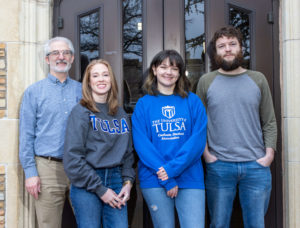For decades, companies overlooked the advantages of taking the science of human nature into consideration when hiring new employees. It was not until the 1980s and ’90s that organizations realized the benefits of quantitative and analytical approaches to help corporations and workplaces make better decisions about hiring and placing employees in positions that best fit their capabilities and personalities.
But who are the brains behind the science of the workplace, or more aptly described, the science of human resources? That would be industrial-organizational (I-O) psychologists. Considering workplace motivation, attitude, personality, analysis, job fit and performance appraisal development systems, these psychologists are the architects of successful and thriving work environments and are equipped with a wide knowledge of psychology from all fields.
I-O at TU

Robert Hogan, professor emeritus of psychology at The University of Tulsa and founder of Hogan Assessment Systems, established the Industrial-Organizational Psychology Graduate Program at TU in the 1980s. The program rigorously trains graduate students to become highly valued I-O psychologists. TU’s I-O psychology program sets itself apart by integrating the master’s and doctoral students in the classrooms. “Although Ph.D. students are required to take more classes, master’s students still receive the same level of training. We don’t distinguish in the classroom, and we know that if our master’s students can meet Ph.D. standards, then they are much better off upon graduation,” said Professor Robert Tett, chair of the Department of Psychology.
Aided by various funding opportunities, program graduates often matriculate to highly successful HR management positions and consulting companies that help organizations develop personnel training, development systems and leadership programs. The academic program also sees alumni move on to large firms like Walmart, Amazon and Home Depot, or even on to executive coaching positions. More than 95% of I-O psychology graduates establish prosperous careers or further their academic journey.
Relevant research
Students and researchers in I-O psychology are deeply invested in the rapid advancement of technology. In just a handful of years, the way companies and employees conduct business interactions and transactions has changed dramatically. Additionally, I-O psychologists are examining the possibilities of virtual reality workplace simulations as well as the use of artificial intelligence for job interviews (the responses of which can be scored by computer algorithm, allowing employers to examine not only what interviewees said but how they said it).

In terms of gaining field experience for I-O students, the program has implemented an internship requirement that could be research-oriented. Most students find local internships at corporations such as Hogan Assessment Systems and Williams or other businesses and consulting firms. In one instance, a student developed a performance appraisal for a taxicab company. Another student fulfilled the requirement by working for the family business and helping with HR-related matters. For their internships to count, students must be engaging directly with real I-O-related issues. Additionally, students must have their internship performance evaluated by their boss and a coworker, both at the mid-point and at the end of the internship.
Third-year Ph.D. student Seth Osborn said that his experience working in the various I-O labs has exposed him to a range of research styles and methods. Brad Brummel, professor of psychology, professor of cyber studies and director of the I-O psychology program, is Osborn’s adviser. “(Brummel’s) perspectives have strongly influenced how I think about topics such as measurement, ethics in research and philosophy of science more broadly. I am grateful to have him as a mentor,” said Osborn.
As for doctoral student Margaret Toich, she is most drawn to research around personality in the workplace and thoughtful survey responses. “My current research investigates the importance of personality-based job, group and organization fit on workplace attraction for job seekers.”
The TU standard

“We make sure that students are knowledgeable when they leave,” Tett said of the rigorous course requirements. Even master’s students must take a comprehensive exam typically reserved for doctoral students. If they struggle, students are required to do remediation in the areas where they struggled so they are confident in their knowledge when they graduate.
TU’s I-O psychology program’s high success rate is due to the high standards that professors set for their students as well as the environment fostered by caring professors. First-year Ph.D. student Allison Stone relayed why she chose TU over other schools: “I thrive when I can be my authentic self and here at TU not only do I feel accepted but also appreciated for my unique experiences and personality. It is an atmosphere in which students are supported to come into their own as a researcher and psychologist.”
A former high school teacher, Stone’s passion comes from a place of real-world experience and a desire to make a difference in the workplace. “TU is collaborative, authentic and transparent,” Stone said, “and that’s what makes the program stand out.”
Do you have what it takes to design efficient and successful workplaces? Consider checking out TU’s I-O psychology program for more information and how to get started. For information on how to finance your I-O psychology degree, check out the funding opportunities provided by the program.






